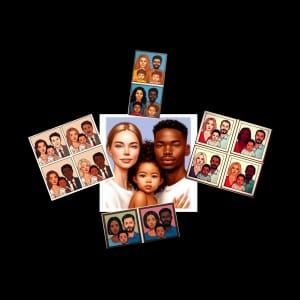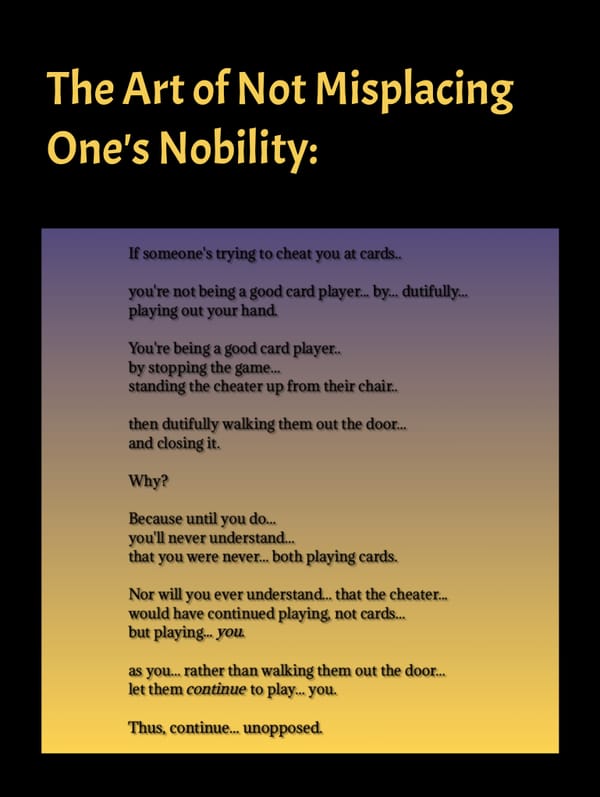“So… what are you?”

Do you happened to know anyone who is, what may be considered, biracial? What do you personally consider them to be?
There’s an old logic puzzle:
How many legs would a four-legged dog have if you called its tail a leg?
Answer: 4
Calling its tail a leg changes neither the remaining fact it still only has 4 legs,
nor the fact that you’re simply incorrect in asserting otherwise.
Nor does calling it that make the dog believe it by suddenly starting to walk on its tail. It simply wouldn’t, not even if it somehow knew doing so would somehow make you feel better about being wrong for believing it’s tail wasn’t a tail, but a fifth leg instead.
The dog will have always known.
Because the dog will have always experienced *itself*
as itself,
and not *your assertion* as itself.
And why should a dog go through the pain and suffering of breaking its own tail by walking on it, just so you feel less sheepish about having incorrectly labeled it?
Different people are physically comprised differently. From height, to number of limbs, to manifestation of sexual reproductive organs, including the two most common biological arrangements, to the spectrum of variations that biologically exist between those two as well. From skin tone, to being an innie or an outie bellybutton-wise, so many ranges within ranges of categories vary and exist.
To continue with the ‘limb orientation’ theme with which this post began, each of my, in total, two arms happen to exist exactly as much as each other. Though I may naturally favor use of one over the other, I am no less aware of the equal existence of both. And no amount of anyone incorrectly calling one of them a ‘tail’, much less saying one is ‘nonexistent,’ will, itself, ever magically make the other one suddenly become the *sole* (no pun intended), or *primary* definition of my limbs.
Not ever.
Many years ago I had a doctor incorrectly measure my height as just over 6 ft. Since, I’d learned that I was actually closer to 5 ft 11, unless I wore a particular pair of shoes that I often do, maybe giving me a deceptive appearance of an inch or so more. Of course I didn’t physically become shorter since that doctor’s original erroneous measuring. I simply never was physically that height. So, if that doctor were to tell me today that I was 6ft 1in, I’d tell them I’m actually closer to 5ft 11in. If that doctor, by way of trying to defend their original incorrect measurement, bizarrely tried to challenge me by asking, “Yes, but don’t you consider yourself closer, in some sense, to 6’1″ than, say, 5’9″ ?” I, of course, would maintain my assertion that, no, in fact, I am neither 5’9″ nor 6’1″.
I am simply 5’11”.
Describing another person as *something,* or as existing in *some way,*
is not what actually makes that person so.
Not ever.
Rather, that person truly experiencing themselves as what they are is what makes them so.
This is also true for *who* they are.
Thus, in order to know what or who that person is, you begin by asking what or who that person’s experience of themselves is.
If you exclude this from your effort to learn either what or who a person is,
you exclude yourself
from ever actually knowing
either what or who a person is.
What am I?
I am of two parents,
this, rather than ‘one, but not the other.’
I am of *their two races,*
this, rather than ‘one, but not the other.’
Ask me *what* I am,
I will tell you… what I am… is them.
I will not tell you ‘I am one of them but not the other.’ I will tell you *I am both of them.*
I will never deny that either of my parents have existed, much less would I deny that I exist as what both of my parents are/were.
I exist, never as one *or* the other.
I exist as both.
And what I am, simply… exists.
Just as what you are simply exists too.
So for those who do, thank you hearing and accepting what I am.
For any who do not…
I acknowledge that you don’t.
We probably won’t be very close.
And it’s okay. I’m at peace with this.
Continue to be uncomfortable with this about me if you wish.
Continue to resent this about me if you wish. Continue to hold any of these ways of rejecting this about me,
denying this about me,
invalidating this about me,
committing to being incorrect about me,
if you wish.
Whoever does choose to not accept what I actually am, and I say this also on behalf of whomever, should they also experience and understand non-acceptance…
your rejection of what I actually am is duly noted. Your rejection of and refusal for acknowledging that I am of two parents and not one is duly noted. Your tacit assertion that only people of singular races, and/or *some* others of *some* dual races, depending on *which* two races, will be allowed acknowledgement as being of both of their parents, thus of both their parents’ races… but that *I’m not* allowed this same respectful regard… because of how you treat each of the two *particular* races that my parents happen to be, as opposed to certain other ‘more acceptably acknowledged’ racial pairings/biracial existences, and thus, from that,
how *what I actually am,*
as opposed to with some others,
must, in some measure.. be denied…
and nonexistent.
Thus further, your regard towards invalidating what I actually am by dismissing one of the two very real people, each literally… *literally* being as much of what I am as is the other…
is duly noted.
Moreover, from your rejection of what I am, and of my identifying as actually being of the two parents who made me, rather than only of one…
your access to the entirely different aspect of *who* I actually am (trust me, by the previous alone, you’ve likely yet to have any idea) is now offline for you, until you can accept *what* I actually am first.
Otherwise, your loss.
Now, if you ask me, by what I’ve described above, how are you to regard others who may have a similar parental background, how are you to treat what *they* are, and *who* they are?
My answer,
if you leave this post
with nothing else but this,
is this:
Ask them.
Do not assume.
Ask them.
As for who they are culturally…
Ask them.
When you have parents of not only two different races, but potentially two different cultures, how cultural identity manifests in the child ranges vastly different from one child of one family of two different cultures, to another child in that same family, to another child of another family of two different cultures, even if the two paired cultures are the same pairing of the two parental cultures in each of these two families. Some kids will have a cultural footprint that skews more towards one parent than the other, and some will have a cultural footprint that reflects a right down the middle hybrid of the two. All permutations of how that child comes to culturally be are okay. If you find yourself saying that you only accept when a child from parents of two different cultures manifest as one of the two particular cultures but not the other, or a perfect blend of the two particular cultures but not skewing either way, welcome to discovering your own subconscious prejudice against that child. This person may actually not culturally be who you try to culturally impose upon them to be. Thus, you may be serving up yet another subtle yet profoundly alienating regard towards who that person actually is. This goes right back to the best rule of thumb in coming to understand who and/or what a person actually is:
Ask them.
In my case, I happen to skew towards the cultural footprint of what many stereotypically associate as Caucasian. (It may be obvious by now that I don’t personally tend to label a person’s culture by hues of skin pigmentation, no matter how commonly associated the two may be in American culture.) For some reason, not all, but some select people only like it when a person of Caucasian and African American parents skews strictly African-American-associated in their cultural footprint. I assure you there are plenty who do not skew thusly, and who, thusly, recognize the tacit rejection from these people’s non-acceptance. And in recognizing this, their particularly held and subtly manifested racial prejudice against them, the recipients of this non-acceptance will probably never feel very close to them. Rejection of individuals tends to have that response.
Unless, that is, one considers that it’s not too late to stop rejecting who that person may or may not be by simply starting over with one action:
Asking them.
To not take my answer’s description of myself, which is based on me as the individual I truly am, and presumptuously impose it onto someone else entirely who’s had no self-expressive say in the matter on who they truly are. Otherwise, one shouldn’t be surprised if…
they don’t appreciate that.
In turn, it’s appreciated to not take someone else’s answer and impose it upon me either. Just as you would not appreciate someone doing so to you based on someone else’s answer for who that someone else is, and not at all based on taking in your expressing who you are.
If it helps to use an analogy, we can think of ourselves as a shoe salesperson. There are a lot of different lengths and widths of feet out there. If someone tells us what their shoe size is, we bring out that shoe size, not the shoe size based on the customer before them, even if the customer before them had the same hairstyle as the current customer, or the same height, or the same skin tone, outfit, accent, or what have you.
We ask them. What size?
Their comfort with us as their shoe salesperson, and indeed, of their very foot, depends on how well we respect this.
So we can simply afford them the basic human respect…
of asking them.
If we want to understand the most insightful definition of an individual, the first crucial step is not categorically excluding that individual from this process.
Ask them.
Then… we listen to their answer. And have the genesis of our understanding what and who that particular individual is, begin to take shape from the listened-to understanding of their answer.
Just as I respectfully ask you to do regarding mine.
The truth of what defines an individual is shaped differently and ranges vastly from one person to the next. There are different individual experiences, individuals come to learn and understand who and what they are differently from one another. That has always been the consistent overall diverse nature & reality of each of humanity’s members. It is of course the basis of why we marvel at just how mind-blowingly varied it has always historically been, from one person to the next, to understand what it means to identify… as a human being.
Which is why it has always been that in order to maintain the integrity of our respect for another person, we always need to know *their* answer, as best and most respectfully as we can realistically pursue it, to the identity question of who and what they are, as the primary basis of how to most truthfully begin to understand & thus define the true reality of their identity of who and what they are for our own most clarified understanding.
You’ll find the answers vary, from subtly to dramatically, from one person to the next. You’ll find unexpected differences from your expectations and how you would answer. You’ll also find unexpected similarities to your expectations and how you would answer. Sometimes you’ll find they express the answer is that they’re still figuring out what their answer is, and they’ll let you know. Sometimes their answer may be that they might even ask you to help them discover what their answer is, to be a part of their process of self-discovery, depending on your relationship with them.
However they related it to you after you ask, the nature of their answer will always be what, above all, serves as the basis of your most respectfully beginning to understand those aspects of their selves, as well as potentially very different from and/or, in fact, even *startlingly similar* to…
yourself.
This, of course, also includes *your* truthful answer to this question regarding your own identity, as being just as respectful the basis of others’ truthful understanding of you.
This is at least a part of what it means to respectfully strive as best as possible not to be prejudiced towards any individual. To literally not prejudge an individual necessarily involves asking the individual who and/or what they are before you prejudge them as being who or what they are. A strong takeaway is this: it has never been about which prejudice you are supposed to have and which one is okay to impose upon an individual without asking. It has always been about not imposing it on an individual in the first place but respecting them as the individual they are by asking them. Its true you may be right some of the time or, debatably, even more times than not, if you use prejudice to assume who someone is. The problem is, you may never know all the times you were wrong when you’ve imposed it on somebody and didn’t listen for, but instead, discounted, ignored, dismissed, or misperceived through your prejudice, who and what they were as actually represented them. And they likely will have experienced this prejudice, however subtle, not just from you, but from everybody else who employs prejudice as a perception model, piled on their collective experience in life along with yours. It’s like little bits of paper being tossed on to a homeowner’s front yard, which each may seem insignificant to the tosser, but not to the homeowner who’s eventually left with a huge pile of trash on they’re home that is not of their making, but comprised of the collective making of every person’s collective disregard for respecting them.
By contrast, if you ask them, you will basically *always* be closer to this respectful understanding of them if you base your understanding of an individual, not on using your prejudices you’re inclined to impose upon them because it worked on a completely separate other person, and which are designed more to validate themselves as correct, even when they’re wrong, but instead by paying another human being the respect of listening to them express who they are, letting that serve as the foundation of your coming to better understand that individual.
That’s all that has really ever been meant by what it means to not be prejudiced against someone. We all have the capacity to impose prejudices on another individual. All of us. They exist in our minds, in our subconscious, collected from the social cues fed to us since birth from community, from media, from our own cultures, and our own families. From racial, to cultural, to gender-based, to economically, academically, professionally, generationally, etc.. Not indulging in prejudice against another individual is comprised of respecting an individual by basing your understanding of that individual, not on the common, or unexamined, or subconscious prejudice du jour, but on your actually taking the most basic respectful time to ask them, so they know that you value making space for people to most genuinely represent themselves, rather than taking umbrage when people ask you not to try to force them to be who your prejudice needs them to be.
And that’s basically it.
So, in as thoughtfully and rationally as can be explained, in my case, you now have the answer to the question of what it means to define what *I* happen to be.
(The more comprehensive answer to *who* I am, is, as with most all of us, less of a blog post, and more of a novel. Or at least several more conversations over coffee.)
If you can hear and respect my answer about me,
thank you for respectfully listening.
Perhaps you’ll also begin to get to know *who* I am over one of those cups of coffee one day, as well, and perhaps I will also get to do so about you.
Regardless, I will nevertheless continue to be exactly the entirety of *what* I actually am, plus *who* I actually am,
as well as *who I continue evolving to be*…
and by definition
nothing ever more,
nothing ever less.
Nor will I ever be made to feel apologetic for what I am, nor ashamed of what I am, despite that there are those who show their shame, discomfort, resentment, and rejection regarding what I am through the most profound way of doing so:
by denying what I am even exists.
So I will simply continue to be what I am,
and whenever asked what that is,
continue to answer
with exactly the truth of that
with no need for its permission, acknowledgement, nor validation
from anyone else at all, ever…
Instead, with my continuing to know so
with complete self-acceptance, always.
What I am is what both my parents are.
They are Caucasian and African-American
Not one or the other.
I am Caucasian and African-American.
Not one or the other.
Accept what I am or don’t.
It still won’t change what I am.
Nor will I ever pretend to change it for anyone else. Because my purpose is to be true to both what I am as well as who I am. By contrast, the purpose of my life is *not ever*
to live in service of betraying who and what I am to make someone else feel more comfortable with their inclination to reject who and what I am.
Nor is that *ever* the purpose of any single person in this world.
Finally,
I will endeavor to always accept & honor the understanding of yours and other individual human beings’ identities through this very same respectfully conscientious basis, to the very best of my diligently listening-to-them/you ability.
So, with much regard & compassion to each of you out there…
Here’s to being the most truthful and best versions of ourselves to each other,
as well as standing up for, listening to, and supporting each other in being just as much so.
Take good care, be safe,
and thanks for listening.



